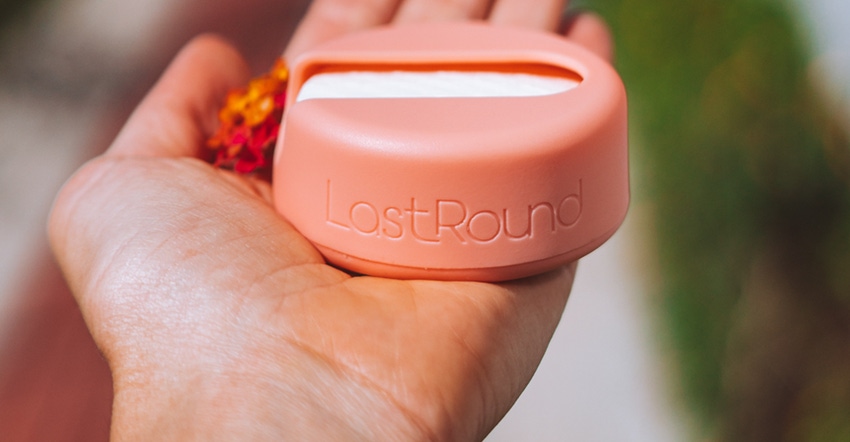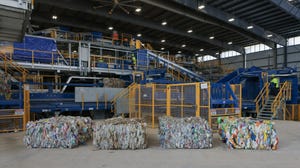LastObject’s Answer to Single-Use Personal Care Products

Eco-startup LastObject is shooting to eliminate 50 billion single-use items by the end of 2023, and that’s just cotton swabs, tissues, and makeup rounds. They manufacture these personal-care products, which are designed to be washed and reused 1,000 to 3,100 times. They’re made from organic cotton and also have components or packaging made from plastics that are either pulled from the ocean or recovered before they hit the environment.
Apparently, the products, which have helped eliminate just over 1 billion single-use items, are catching on. In two years, the new company, based out of Copenhagen, Denmark, has set up three warehouses around the world; one in Europe, one in the U.S.; and one in Asia. It sells to retailers and individual consumers, with products available through brick-and-mortar stores, Amazon, and other online outlets.
“We just rounded selling one million swabs, which we call LastSwab. It was our first product,” says Isabel Aagaard, LastObject founder. The core is recovered, reinforced polypropylene, and the ends are thermal plastic.”
Next, she and her two cofounders launched LastTissue, which is a pocket-size tissue pack made of organic cotton with the casing made of silicone which can be continuously recycled (given infrastructure to do so). The third product, LastRound, which is used to remove makeup and to clean skin, is 30% cotton and 70% wood fiber, with the casing made from repurposed plastic.
“Our goal when we design any product is that it has at least 10 times the positive environmental impact than the traditional single-use products they replace. We are achieving this today based on our own data, but we are doing a life-cycle assessment (LCA) that is being reviewed by a third party that follows standards of the International Organization for Standardization,” ISO - ISO 14044:2006 - Environmental management — Life cycle assessment — Requirements and guidelines says Kristian Jørgensen, LastObject CEO.
The LCA will assign specific values for 18 impact categories, such as ozone formation, water consumption, and marine ecotoxicity.
“Of course, waste from single-use products can negatively impact any of these 18 categories, either during the production phase, the use phase, or in the end-of-life phase … The resources required to produce what is only used once, and the negative impact from getting rid of those things, has harmful consequences versus a product that can be used 1,000-plus times,” Jørgensen says.
LastObject works with external companies such as SGS, which does inspections, verification, and testing, to determine how many washes the products can withstand while working as desired. And the company works with its material suppliers to understand the durability of each material and how to best clean and maintain it.
Now up to seven founders and about 30 “freelancers” who work remotely, LastObject started as three designers; Aagaard is one of them.
“I was working in hospitals designing medical equipment, and my two cofounders are product designers that did kitchenware and other household items. We design on our computers, and they are 3D printed. So we can have it in our hand and try it out. How does it feel? Can I get the rounds out of the packing easily? Do the swab sticks need to be stronger so they won’t break when they bend?” Aagaard says.
She and her team did crowdfunding to present and validate their place in the market.
“As designer you sit with your ideas and think they are awesome but sometimes others may not agree. We want to create something that people want and will pay for,” she says.
For the month of April, in honor of Earth Day, for every product bought one kilo of littered plastic is diverted from the ocean through a partnership with Plastic Bank, whereby LastObject donates some of the sale proceeds.
Then it does Green November.
“It’s a pissoff for black Friday. We thought it was awful to incentivize people with discounts to buy a lot of unnecessary stuff that creates a lot of waste. Instead, we try and incentivize people to buy something more sustainable while helping to clean up the environment,” Aagaard says.
Akos Santé distributes health care products and distributes LastObject’s goods in France, Germany, and Switzerland.
Taking on this line made business sense to Cannelle Fleischmann, co-founder of Akos Santé.
The company is long focused on sustainable health and beauty products, “so LastObject is blending very well in our portfolio. LastSwab, the first product, was a great innovation that quickly drove a lot of enthusiasm among retailers and consumers, leading to a very strong sales uptake,” Fleischmann says.
It’s been moving fast.
“You don’t need a lot of detailing before concluding a deal; LastSwab is a product you can sell right away, just by showing it … It is an easy way to reduce your waste, and an easy-to use, great designed product that looks fancy in your bathroom. It is also a great little present – we’ve had a lot of customers buying it for someone else,” Fleischmann says.
LastObject’s growth plans are centered around Europe and the U.S., with different approaches for the two regions. In Europe the partners work with exclusive distributors who have the full responsibility to develop each market. In the U.S. they themselves are building distribution and sales.
“Our sales strategy is to start with shops that are very dedicated to the sustainable agenda, and gradually move to larger chains, especially as their sustainability agenda grows. Today the most environmentally conscious customers in the U.S. are found on the two coasts, so that is where we concentrate most of our efforts today,” Jørgensen says.
“At the end of the day, he says, it really is a matter of making three things happen: “1) make people aware there is a better alternative to single use; 2) make sure our products are of great quality and an excellent design so that people want to try them; and 3) make sure our products are available online and in the shops where the customers are already shopping today.”
About the Author(s)
You May Also Like




